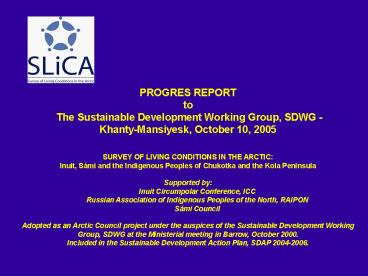Survey of Living Conditions in the Arctic - PowerPoint PPT Presentation
1 / 15
Title:
Survey of Living Conditions in the Arctic
Description:
Inuit Circumpolar Conference, ICC. Russian Association of Indigenous Peoples of the North, RAIPON ... Ministerial in Russia 2006 on the circumpolar comparisons; ... – PowerPoint PPT presentation
Number of Views:55
Avg rating:3.0/5.0
Title: Survey of Living Conditions in the Arctic
1
PROGRES REPORT to The Sustainable Development
Working Group, SDWG - Khanty-Mansiyesk, October
10, 2005 SURVEY OF LIVING CONDITIONS IN THE
ARCTIC Inuit, Sámi and the Indigenous Peoples
of Chukotka and the Kola Peninsula Supported
by Inuit Circumpolar Conference, ICC Russian
Association of Indigenous Peoples of the North,
RAIPON Sámi Council Adopted as an Arctic Council
project under the auspices of the Sustainable
Development Working Group, SDWG at the
Ministerial meeting in Barrow, October 2000.
Included in the Sustainable Development Action
Plan, SDAP 2004-2006.
2
- Status, Preliminary Results and Future of SLiCA
3
Measuring living conditions and individual
well-being
- Around the world, a growing number of
economists, social scientists, corporate leaders
and bureaucrats are trying to develop
measurements that take into account not just the
flow of money but also access to health care,
free time with family, conservation of natural
resources and other noneconomic factors. - The goal, according to many involved in this
effort, is in part to return to a richer
definition of the word happiness, more like what
the signers of the Declaration of Independence
had in mind when they included the pursuit of
happiness as an inalienable right equal to
liberty and life itself. - Andrew C. Revkin, The New Yourk Times, October
4, 2005
4
What is SLiCA?
- An international survey comparing living
conditions among Inuit and Saami peoples and the
indigenous peoples of Chukotka.
www.arcticlivingconditions.org
5
SLiCAs objectives are
- For Arctic Native peoples and researchers to work
together - To include living conditions most relevant to
Arctic peoples - To compile data and perform causal analyses
- To advance our understanding of how living
conditions are interrelated - To improve the basis for decision-making
- To educate students and researchers and establish
networks.
6
What is the status of the project?
- Interviewing is complete in Canada, the United
States and Chukotka - Interviewing close to be comleted in Greenland
- Interviewing is temporarily stopped due to lack
of funding in Sweden, Norway and the Kola
Peninsula - Inteviewing was never started due to lack of
funding in Finland - The international team has identified a set of
five analysis themes - We have used Alaska data to provide examples of
analysis results.
7
Preliminary analysis themes
- The importance of social relationships and the
standard of living to settlement patterns - The importance of a mixed cash- and harvest/
herding- based economy to living in the Arctic - Relationships between the likelihood of a major
depression and different dimensions of living
conditions - The influence of educators and missionaries
- The influence of policies on living conditions
8
Status på dataindsamling/ interviewing
9
Sample analysis results based on 663 interviews
in the Iñupiat settlement region of Alaska
10
Hypothesized relationships between the likelihood
of a major depression and different dimensions of
living conditions
Social support
Traditional Skills
Social Well-being
Standard of Living
Hunting - Herding
Cultural Values
Likelihood of a major depression
Environment
Sense of local control
Employment
Western Education
Civic Participation
11
Preliminary results from Alaska
- When we looked at the relative importance of 22
different dimensions of living conditions to
overall well-being, satisfaction with
opportunities to hunt and fish was most
important. - And these four factors best explain likelihood of
major depression - Satisfaction with life as a whole
- Importance of traditional values
- Western education level
- Participation in domestic production activities
like hunting, herding, and processing
12
- The results in the table are preliminary (from
80 of the total Greenland sample) and not yet to
be published. - The interval covers regional variations in the
responses
13
The fututre of SLiCA 2005 - ?
- Conclude datacollection/interviewing and data
entry procedures - Carry out analyses regionally and by country
- Publish results continuously
- Compare data and analyses between
regions/countries - Report to the Arctic Council Ministerial in
Russia 2006 on the circumpolar comparisons - Make the SLiCA-data available to the scientific
and indigenous communities of the Arctic as well
as to political and administrative decision
makers at the local, regional, national and
international levels. An IPY proposal A SLiCA
Remote Access Analysis System, RAAS has been
submitted September 30. - Make SLiCA a practicable survey instrument in
other Arctic regions - Offer SLiCA as an instrument to conduct surveys
among other indigenous peoples in cooperation
with the peoples in question and e.g. United
Nations Permanent Forum on Indigenous Issues
(UNPFII) and the World Bank - Utilize data and carry out analyses in
cooperation with other research projects,
partners and stakeholders (e.g. the indigenous
peoples organisations and public authorities at
different levels within the Arctic).
14
Funded by Nordic Council of Ministers, NMR, The
Greenland Home Rule Government, The Commission
for Scientific Research in Greenland, KVUG, The
Barents Secretariat, Nordic Arctic Research
Program, NARP, Danish Research Council for the
Social Sciences, SSF, Swedish Research Council
for the Social Sciences, Ministry of the interior
Dept. of municipalities, Norway, The Joint
Committee on Research Councils for Nordic
Countries, NOSS, Social Sciences and Humanities
Research Council of Canada, SSHRC, National
Science Foundation, NSF, Statistics
Canada. International coordinator Statistics
Greenland www.statgreen.gl SLiCA contact
Project Chief Birger Poppel bipo_at_ilisimatusarfi
k.gl Project website www.arcticlivingcond
itions.org
15
We have much more to learn and much more to learn
from
16
www.arcticlivingconditions.org































